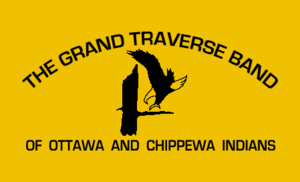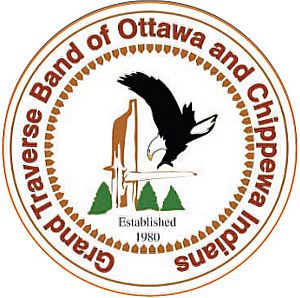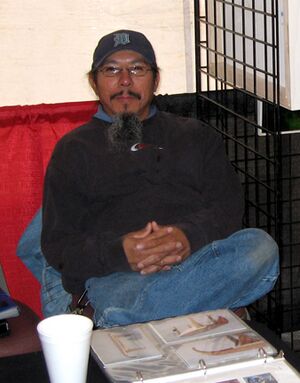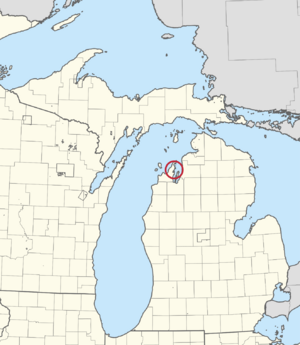Grand Traverse Band of Ottawa and Chippewa Indians facts for kids
 |
|

Seal of the Grand Traverse Band of Ottawa and Chippewa Indians
|
|
| Total population | |
|---|---|
| 3,985 enrolled members | |
| Regions with significant populations | |
| Languages | |
| Ojibwe (Ottawa dialect), English | |
| Related ethnic groups | |
| Ojibwe, Potawatomi and other Algonquian peoples |
The Grand Traverse Band of Ottawa and Chippewa Indians (which is Gichi-wiikwedong Odaawaag miina ojibweg in their language) is a Native American tribe in northwest Michigan. Being "federally recognized" means the United States government officially recognizes them as a sovereign nation. Their main offices are in Peshawbestown, Michigan.
This tribe is made up of people from the Ottawa (Odawa) and Chippewa (Ojibwe) nations. They are one of three federally recognized Odawa tribes in Michigan. The current Tribal Council includes Chairman David Arroyo. The tribe owns and runs several businesses, like the Leelanau Sands Casino, the Turtle Creek Casino and Hotel, and the Grand Traverse Resort & Spa.
Contents
Who Are the Anishinaabeg?
The people of the Grand Traverse Band call themselves Anishinaabeg. This name refers to a larger group of Native American peoples. They were historically part of the Three Fires Confederacy. This was a powerful alliance of the Odaawaa (Ottawa), Ojibwe (Chippewa), and Boodewaadami (Potawatomi) peoples.
How the Tribe Gained Recognition
For many years, the Grand Traverse Band worked to be officially recognized by the U.S. government. They first applied in the 1930s and 1940s but were turned down. In 1978, a leader named Dodie Harris Chambers helped lead a new effort.
Finally, on May 27, 1980, the tribe was formally recognized. This made them the first federally recognized Odawa tribe in Michigan. Later, in the 1980s, they became one of the first tribes in the U.S. to own a casino. This was possible because of new laws about tribal gaming.
A Look at Their History
The Ottawa, Chippewa, and Potawatomi peoples are part of the Algonquian language family. Over many years, their ancestors moved from the Atlantic coast. They settled around the Great Lakes in what is now Canada and the Midwest United States. This area includes states like Michigan, Ohio, and Wisconsin.
During the 1800s, these tribes faced pressure from settlers. They had to give up most of their traditional lands to the governments. Today, they have federally recognized lands in Canada, Michigan, Wisconsin, and Minnesota.
The Ottawa People's Story
The name Ottawa, or Odawa, is thought to mean "trader." This name likely came from their history as skilled traders. The Ottawa people are descendants of nine bands who signed important agreements. These agreements were the Treaty of 1836 and the Treaty of 1855.
After the 1855 Treaty, many Ottawa bands moved to new lands. These lands were in Mason and Oceana counties in Michigan. Their traditional villages were along rivers like the Grand, White, and Manistee. The Ottawa and Chippewa Treaty of Detroit in 1855 helped create a shared reservation for Ottawa and Chippewa peoples.
The Chippewa People's Story
The Chippewa people are also known as "Ojibwe" or "Anishinaabe." They are one of the largest Native American groups in North America. Their population lives in both Canada and the United States. For example, the Bay Mills Indian Community is a Chippewa group. They live on land that their ancestors occupied on both sides of the U.S.-Canada border.
The Tribe Today
Members of the Grand Traverse Band are descendants of the Ottawa and Chippewa peoples. These groups lived in northern Michigan and signed treaties with the U.S. government.
The tribe has its own government. It includes an elected tribal chair and six tribal council members. These leaders are chosen by the tribe's members. The council manages the tribe's programs, money, and administration. They also appoint judges to handle legal matters for the tribe.
The tribe cares deeply about its natural resources. This includes Grand Traverse Bay, Lake Leelanau, and Elk Lake. They also protect forests and areas important for traditional hunting, fishing, and gathering plants. The tribe has a Natural Resources Department. This team includes game wardens, biologists, and environmental staff. They work to protect the land and water for future generations.
Their Land and Reservation
The official land of the Grand Traverse Band is called the Grand Traverse Indian Reservation. It was established on May 27, 1980. This land includes areas the tribe has bought. The tribe's traditional lands from the 1836 Treaty cover a much larger area. This includes parts of northern Michigan and the eastern Upper Peninsula.
Most of the reservation land is in Suttons Bay Township in Leelanau County, Michigan. There are also smaller pieces of land in four other counties: Benzie, Antrim, Grand Traverse, and Charlevoix. The total land area of the reservation is about 2.5 square kilometers (about 1 square mile). In 2000, 545 people lived on the reservation. About 80% of them identified as Native American.
The tribe's service area covers six counties: Antrim, Benzie, Charlevoix, Grand Traverse, Leelanau, and Manistee. The tribe has about 3,985 members in total. About 1,610 of them live in the tribal areas.
Eyaawing Museum and Cultural Center
The Eyaawing Museum and Cultural Center opened in 2009. It is located in Peshawbestown, Michigan. This center is a place for the Grand Traverse Band to share their heritage and culture. The museum has a gift shop where you can find art from tribal artists. It also offers educational materials, maps, and books about their history.
Learning About Their Stories
An important study of the Grand Traverse Band was done by Jane Willetts Ettawageshik. She spent about two years learning from the community. She recorded many Anishinaabe stories. These stories explain how the Anishinaabe people connected with their land and each other. They share their values, views, and history in Northern Michigan. These stories have been put into a book called "Ottawa Stories from the Springs."
Notable Tribal Members
- Yvonne Walker Keshick, a talented beadwork artist.
- Pun Plamondon, a storyteller and activist.
- Kathleen R. Johnson, a geologist who studies past climates.



